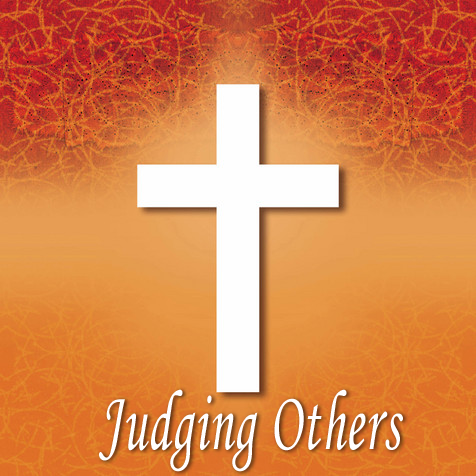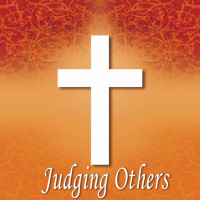
One of the biggest reasons we feel justified in condemning others is because the apostles did it in their teachings and writings. Peter, James, John, Paul, Jude, and even the unknown author of Hebrews all seem to criticize and condemn people with whom they disagreed. Paul instructs the believers in Corinth to hand a man over to Satan for the destruction of his flesh (1 Cor 5:5). Paul did this himself to Hymenaeus and Alexander so they would be taught not to blaspheme (1 Tim 1:20). Peter spends a good portion of his second letter condemning false teachers (2 Peter 2), and in John’s letters, he accuses some of having the spirit of the antichrist (1 John 2:18-23; 2 John 7-11). And Jude, though he wanted to write something positive and encouraging, found it necessary to write a letter of warning against the false teachers who were infiltrating the church. Similar examples could be taken from almost every letter in the New Testament.
So if the early apostles felt justified in condemning, criticizing, and even handing some people over to Satan for the destruction of their flesh (we’ll look at this tomorrow), can we not also do the same thing today?
Yes and no. The problem is that we have misunderstood who the apostles were judging, and until we get this straightened out, we must not judge others.
The Judgement of the Apostles
Most of the people Christians want to condemn today are the ones that Jesus and the apostles would have loved, embraced, accepted, and welcomed: the sinners, the traitors, the prostitutes, and the drunkards. And most of those whom Jesus and the apostles condemned and criticized are the same people who quickly rise in the ranks in most of our churches, and find themselves in pastoral positions of large churches or as prominent members of board meetings. We tend to judge those whom Jesus and the apostles loved, and love those whom Jesus and the apostles judged.

So while I do believe that there is room for some judgment and criticism of others, it must always be “within the family (1 Cor 5:12). That is, judgment is reserved only for those within Christianity, and preferably, those within our own denomination, congregation, or fellowship. We have no business judging and condemning those about whom we know very little. When reading through the letters of Paul, Peter, James, John, and Jude, it appears that in nearly every case, they personally know the people they criticize.
The Apostles Never Condemned Others to Hell
One key point in this discussion is to remember that not a single one of these judgments and condemnations by apostles was to condemn a person to death or to everlasting torment in the Lake of Fire. The apostles knew, as we saw above, that this sort of judgment is the task of Jesus alone. The apostolic writers criticized and even condemned some of the beliefs and behaviors of some of the church members, but they never went so far as to think they had the right or the authority to consign a person to everlasting hell. They knew this was not their job.
But what about Paul’s statements in 1 Corinthians 5:5 and 1 Timothy 1:20 about handing a person over to Satan? Doesn’t this mean that Paul is consigning them to everlasting hell? No, it does not. We’ll see why in my post tomorrow.




Do you agree with this fellow that critics of the Bible do not deserve the benefit of a doubt? http://www.tektonics.org/af/calcon.html
My own view is that the Bible contains so many verses about judging people in the congregation, outside of the congregation (the world), etc., that each Christian has to pick and choose whom to judge and why. The Bible doesn’t seem to do that for you:
http://edward-t-babinski.blogspot.com/2010/01/challenge-to-christians-judge-not-or.html
Ed,
There are a lot of crazies out there who, as the guy in the article stated, feel like they can say anything they want to say, simply because they have a keyboard and an internet connection. There certainly is A LOT that goes into studying any single passage in Scripture, and nobody can fully wrap their mind around all of it, which is partly why I think we need each other.
So I don’t ignore these others, but I don’t spend much time on them either.
I read your links also, and left a comment there. Thanks for alerting me to it.!
…that their soul might be saved…
I am enjoying your series. 🙂
Thanks Katherine.
This was a great post. I try to keep it simple, but judge me if I’m wrong..we judge fellow Christians, but not non-Christians…but then extremes on both sides are wrong as well.
Anthony,
That is a good, simple, concise summary.
I suppose I just should have written that….ha!
Of course, we should really be careful with judging other Christians…there is far too much of this going on today, in my opinion.
Like I said, extremes on either side are just as wrong. Some people become the evil church lady with a ruler, and some people will let non-Christians commit atrocities.
Balance
Balance is my mantra! Easier said than done…
I think Jesus said as much to us about not judging as judging! Denominationalism hinges on one Christian judging anothers doctrine’ and teachings! It’s one thing to hinge our arguments on what the apostles did or did not say regarding whatever subject. However, all the apostles emphasised Christ’s grace and love in their letters and writings above and beyond all else. But, when we look at the gospel’s and in particular Jesus’s model to us of how to live and how to act, it is all about grace, love, mercy, forgiveness, tenderness, kindness…… Jesus did’nt say; ‘blessed are those who judge for they will be given more authority’! Have we got the argument the wrong way round…. should’nt our start point be the love of Christ in all things? Even within the body, judgement is always negative and poorly received. In an institutional setting, it is a useful tool for the leaders, or whoever decides they have the right to judge the others, to manage and control the pews! How many Christian’s have walked from church’s because they were ‘in judgement’ over some such issue that really demanded love and mercy! Who decides on who has the authority to be the judge?
AV,
So true, every word.
I have been doing a lot of reading on the concept of judging in the Bible recently, and have been shocked to learn what “judging” really is all about in Scripture.
One of the best things I have read so far comes from CS Lewis in Reflections on the Psalms.
Some day I will write some posts about judging in the Bible.